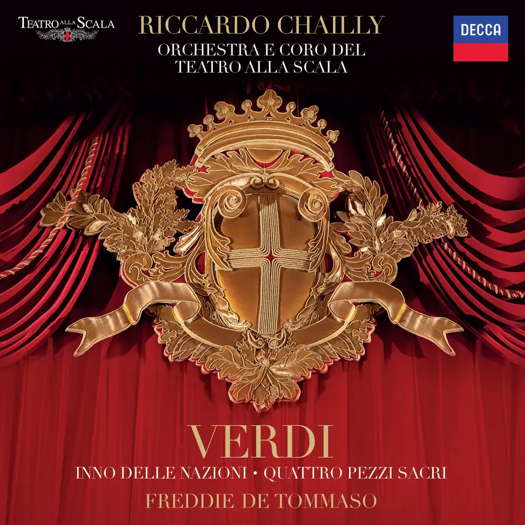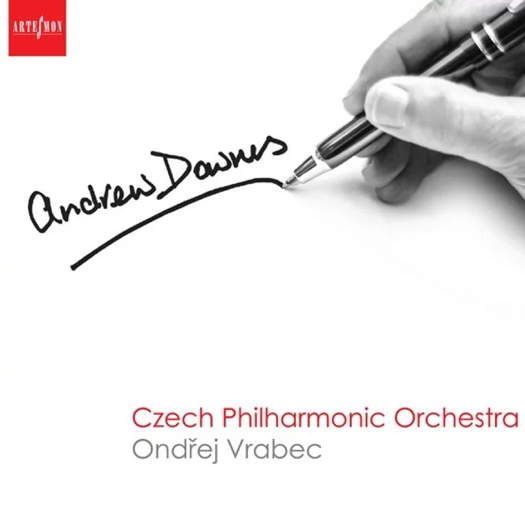- New College Oxford Choir
- Robert Matthew-Walker
- Emile Renan
- Erdem Misirlioglu
- Francis Jackson
- John Wilson
- Myroslav Skoryk: Melodiya
- Hawkeye Publishing Pty Ltd

Drama and Emotion
GERALD FENECH finds much to enjoy and discover on this recent Verdi album from Freddie De Tommaso, Riccardo Chailly and colleagues at Teatro alla Scala, Milan
'... Chailly's spirited empathy for these pieces is evident throughout, and the La Scala forces respond with flair and vigour, as does tenor Freddie de Tommaso.'
For the 1862 World's Fair in London, composers from four countries were commissioned to compose festive music. The choice fell on Meyerbeer for Germany, Auber for France, Sterndale Bennett for Great Britain and Rossini for Italy. When the latter refused the invitation, the choice fell on Verdi. At the time of composition, Italy had been unified for most of its territory and only three regions were left for all the country to be one whole.
In this climate of excitement Verdi met the twenty-year-old poet Arrigo Boito, who wrote a text on peace and friendship between peoples. In contrast to Boito's text, the composition does not end with a hymn to art but with the notes of 'God Save the Queen', the 'Marsellaise' and the 'Canto degli Italiani'. The Inno delle nazioni was completed in Paris between 24 February and 31 March 1862, but the piece was not premiered at the opening concert, but at a complementary concert at the Royal Opera House on 24 May 1862.
Listen — Verdi: Andante mosso (Inno delle nazioni)
(4870255 track 1, 1:24-2:16) ℗ 2024 Universal Music Operations Ltd :
The 'cantata' was a huge success but, for unknown reasons, this work remains a rarity, especially in the recording sphere. The opening chorus, 'Glory to the Highest Heavens', is preceded by a short prelude, after which the solo part follows, 'Sublime Spectacle'. The Bard has the misery of past conflicts behind him and invokes peace and friendship between peoples, 'Brotherhood'. In the following prayer, 'Lord who on earth', which the chorus repeats, the Bard greets England and France, while the orchestra intones the respective national anthems.
Listen — Verdi: Andante mosso (Inno delle nazioni)
(4870255 track 3, 0:00-7:04) ℗ 2024 Universal Music Operations Ltd :
This is followed by a hymn to Italy, 'O Italia, O Italia, o patria mia', in which the 'Canto degli Italiani' by Mameli and Novaro is quoted. The final part includes a contrapuntal passage where 'God Save the Queen' and the 'Marsellaise' combine with the 'Canto degli Italiani' to form a magnificent passage of polyphonic complexity. A final reprise of the English Anthem brings an end to this stirring piece with the word 'Glory'.
After Verdi finished Aida in 1871 and the Requiem Mass in 1874, he retired from composing for years, writing only minor sacred compositions. The earliest of the Quattro Pezzi Sacri in terms of its composition date is what came to be known as Laudi alla Vergine Maria. It was composed between 1886 and 1889, during which time Verdi was also working on Otello.
Listen — Verdi: Laudi alla Vergine Maria (Quattro Pezzi Sacri)
(4870255 track 6, 0:00-0:48) ℗ 2024 Universal Music Operations Ltd :
The second of the Pezzi to be written was the Ave Maria, whose setting is built on an enigmatic scale. Originally composed in 1889, Verdi revised it for publication in 1897.
The Te Deum was begun in 1895, two years after the premiere of Falstaff and was only finished in the summer of 1896. The 'Stabat Mater' followed and all four pieces were sent to Verdi's publisher, Casa Ricordi, in June 1897.
According to his wishes, three pieces were premiered on 7 and 8 April 1898 at the Paris Opera in a concert conducted by Paul Taffanel. The work left out was the Ave Maria.
Listen — Verdi: Ave Maria (Quattro Pezzi Sacri)
(4870255 track 4, 4:06-4:44) ℗ 2024 Universal Music Operations Ltd :
This sublime issue will thrill all those Verdi lovers who wish to delve deeper into the composer's relatively hidden pieces. For the rest, there is so much to enjoy and discover. Riccardo Chailly's spirited empathy for these pieces is evident throughout, and the La Scala forces respond with flair and vigour, as does tenor Freddie de Tommaso.
Off the beaten track Verdi, but still budding with drama and emotion. Sound and presentation are first-rate.
Copyright © 9 July 2024
Gerald Fenech,
Gzira, Malta





